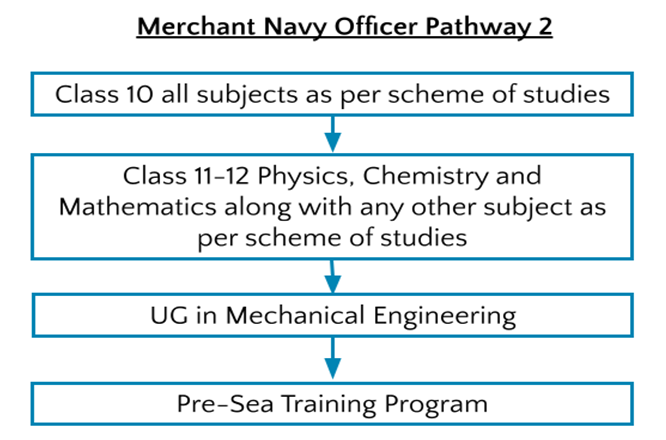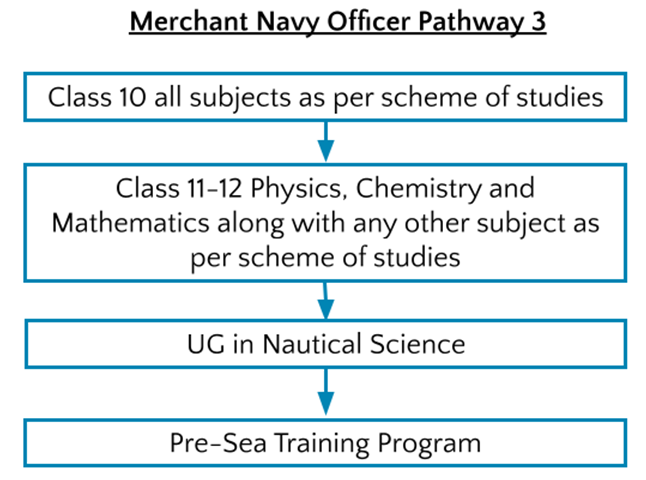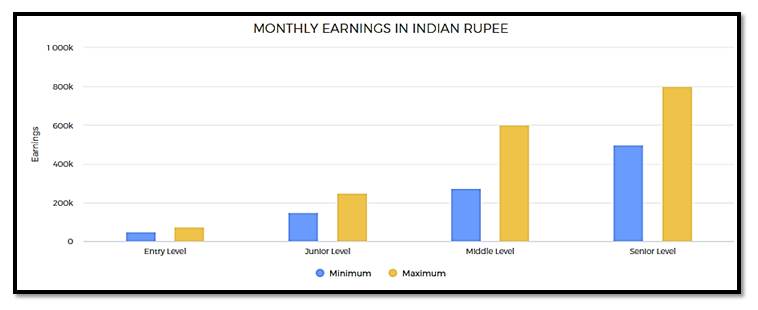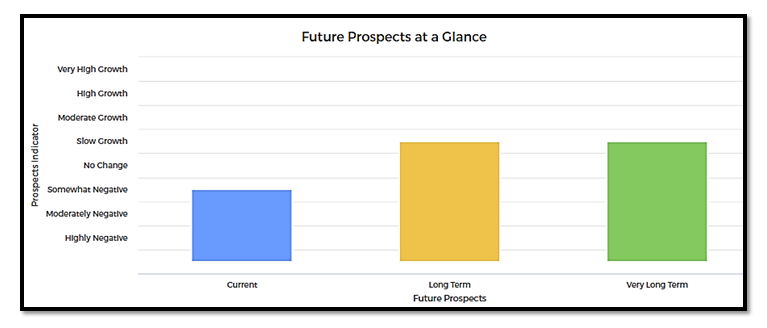Merchant Navy Officer
Entry Level Qualification
Graduate
Career Fields
Government & Defense Services
For Specially Abled



Career Entrance Exam
About Career
PARTICULARS | DESCRIPTION |
Name | Merchant Navy Officer |
Purpose | Manage And Operate Commercial Ships |
Career Field | Government & Defense Services |
Required Entrance Exam | UPSC NDA |
Average Salary | 600000 - 800000 Rs. Per Year |
Companies For You | Great Eastern Shipping, NYK Shipmanagement, Maersk Line & Many More |
Who is Eligible | Graduate |
1. As a Merchant Navy Officer, you will be working on the merchant vessels that are registered in a specific country. Merchant's vessels include cargo carrier ships, container ships, oil tanker ships, and other similar ships which carry cargo, fishing vessels as well as passenger ships, yachts, luxury cruise ships, etc. which carry passengers from one port to the other. Merchant Navy Officers work on board of these ships as per the International Convention on Standards of Training, Certification and Watchkeeping for Seafarers.
2. As a Merchant Navy Officer, you will be in charge of the ship once it is in water. Some of you will be a part of the engineering department where you will take care of the engines and all the machinery, equipment, devices, and systems which include all mechanical, electrical and electronic systems. Some of you will be one of the deck officers and you will be responsible for the safe passage of the ship in the water. As a deck officer you will be in charge of the overall navigation of the ship and the communication systems. You will also be in charge of all the services on board such as kitchen, food and beverage services, housekeeping services, laundry services, safety of the passengers, etc.
Key roles and responsibilities
As a merchant navy officers, you will have different roles and responsibilities based on your specialised area of work. Following is the list of few roles and responsibilities across the specialities:
If you are an engineer working as a Merchant Navy Officer:
1. You will be responsible for supervising other engineers and crew members. You will also train them for daily routine activities and emergency duties.
2. You will be responsible for performing monitoring activities to ensure that your ship complies with all international regulations and standards for life-saving equipment, pollution preventatives, etc.
3. You will check, test and maintain all automatic controls and alarm systems on the ship.
4. You will be responsible for preparing plans, estimates, design and construction schedules, and contract specifications, including any special provisions.
5. Check, test, and maintain automatic controls and alarm systems.
6. You will evaluate the operation of marine equipment loaded on the ship.
If you are working as a Deck Officer on the ship:
1. You will be responsible for steering and operating the vessel.
2. You will also manage and operate radios, depth finders, radars, lights, buoys and lighthouses.
3. You will be responsible for docking and undocking vessels. You will also manoeuvre the ship through narrow spaces such as locks.
4. You will be adjusting navigation according to weather conditions.
5. You will regularly inspect the ship so that it is efficient and safe for operation. You will also ensure all regulations are followed.
6. You will read all kinds of gauges fixed on the ship to verify sufficient levels of hydraulic fluid, air pressure, or oxygen.
7. If there is anyone sick on the ship, you will be responsible for taking care of the patient’s health by providing medication, hygiene and nutrition. If required, you will supervise, perform and interpret tests.
Career Entry Pathway
Class 10 all subjects as per scheme of studies – Class 11-12 Physics, Chemistry and Mathematics along with any other subject as per scheme of studies– UG in Marine Engineering - Pre-Sea Training Program
After your Class 11-12 Physics, Chemistry and Mathematics along with any other subject as per scheme of studies, you can do a Bachelor's degree in Marine Engineering. Then you can do a Pre-sea training program and get a job on board of a merchant navy ship as a Fifth Engineer.
Class 10 all subjects as per scheme of studies – Class 11-12 Physics, Chemistry and Mathematics along with any other subject as per scheme of studies – UG in Mechanical Engineering - Pre-Sea Training Program in Marine Engineering
After your Class 11-12 Physics, Chemistry and Mathematics along with any other subject as per scheme of studies, you can do a Bachelor's degree in Mechanical Engineering. Then you can do a Pre-sea training program in Marine Engineering and get a job on board of a merchant navy ship as a Fifth Engineer.
Class 10 all subjects as per scheme of studies – Class 11-12 Physics, Chemistry and Mathematics along with any other subject as per scheme of studies – UG in Nautical Science - Pre-Sea Training Program
After your Class 11-12 Physics, Chemistry and Mathematics along with any other subject as per scheme of studies, you can do a Bachelor's degree in Nautical Science. Then you can do a Pre-sea training program and get a job on board of a merchant navy ship as a Cadet or Fourth Officer.
Required Qualification & Competencies
1. To become a Merchant Navy Officer in the Engineering function, you should complete a Bachelor’s degree in Marine Engineering or Mechanical Engineering. You can get a job thereafter and after a pre-sea training, start working as the Fifth Engineer and move up to become the Chief Engineer onboard of a ship.
2. To become a Merchant Navy Officer in the Deck function (as an Officer), you should complete a Bachelor’s degree in Nautical Science or in Physics and Mathematics. Thereafter post a pre-sea training program, you can start working as a Fourth Officer and move up to become the Captain of a ship.
MINIMUM EDUCATION REQUIRED | MAXIMUM EDUCATION REQUIRED |
Under Graduate Undergraduate Degree / Honours Diploma / Graduate Diploma (equivalent to a Degree) Programs for which the minimum eligibility is a pass in Higher Secondary / Class XII School Leaving examination. | Under Graduate Undergraduate Degree / Honours Diploma / Graduate Diploma (equivalent to a Degree) Programs for which the minimum eligibility is a pass in Higher Secondary / Class XII School Leaving examination. |
Competencies Required
Occupational Interests
1. Investigative: You should have interests for Investigative Occupations. Investigative occupations involve working with ideas and quite a lot of thinking, often abstract or conceptual thinking. These involve learning about facts and figures; involve use of data analysis, assessment of situations, decision making and problem solving.
2. Realistic: You should have interests for Realistic Occupations. Realistic occupations involve more practical and hands-on activities than paperwork or office work. Realistic occupations often involve physical activities for getting things done using various tools and equipment.
3. Conventional: You should have interests for Conventional Occupations. Conventional occupations involve repetitive and routine tasks as well as fixed processes or procedures for getting things done. These occupations involve working more with data, systems, and procedures and less with ideas or creativity.
Abilities
1. Abstract Reasoning: The ability to understand ideas which are not expressed in words or numbers; the ability to understand concepts which are not clearly expressed verbally or otherwise.
2. Deductive Reasoning: The ability to apply general rules and common logic to specific problems to produce answers that are logical and make sense. For example, understanding the reasons behind an event or a situation using general rules and common logic.
3. Inductive Reasoning: The ability to combine pieces of information from various sources, concepts, and theories to form general rules or conclusions. For example, analysing various events or situations to come out with a set of rules or conclusions.
4. Inter-Personal: The ability to build and maintain good relationships with others at workplaces and elsewhere.
5. Mechanical Reasoning: The ability to apply basic physical principles and theories to understand how mechanical objects such as tools and machinery works and the ability to understand the rules or laws governing the work of machinery, tools and bodies in motion.
6. Numerical Reasoning: The ability to add, subtract, multiply, divide, and perform other basic numerical calculations correctly.
7. Oral Comprehension: The ability to listen to and understand information and ideas presented through spoken words and sentences.
8. Oral Expression: The ability to communicate information and ideas in speaking so others will understand.
9. Problem Sensitivity: The ability to tell when something is wrong or is likely to go wrong. It does not involve solving the problem, only recognizing there is a problem.
10. Spatial Ability: The ability to visualise three dimensional objects by looking at the objects in paper or visualise objects mentally in three dimensions.
11. Speed of Closure: The ability to quickly make sense of, combine, and organize information into meaningful patterns.
12. Verbal Reasoning: The ability to think and reason with words; the ability to reason out ideas expressed in words.
13. Written Comprehension: The ability to read and understand information and ideas presented in writing.
Knowledge
1. Engineering and Technology: Knowledge of various applications of one or more branches of Engineering Science & Technology to manufacture and produce various goods or construct or erect various structures. This include knowledge about design, development, prototype testing, manufacturing, construction, installation, repair and maintenance.
2. Physical Science: Knowledge of physical principles, laws, their interrelationships, and applications to understand fluid, material, earth, ocean, atmosphere, and space dynamics, as well as mechanical, electrical, atomic and sub- atomic structures, properties and processes.
3. Administration: Knowledge of various administrative and operational functions in managing a business or an organisation such as general administration, facility management, front office management, back office management, etc.
Skills
1. Active Learning: Focused and continuous learning from various sources of information, observation and otherwise for application in getting work done.
2. Active Listening: Giving full attention to what other people are saying, understanding the points being made by others, asking questions, etc.
3. Communication in English: Skills in communicating effectively in writing as well as verbally with others in English language.
4. Coordination: Skills in working together with other people to get things done.
5. Critical Thinking: Skills in analysis of complex situations, using of logic and reasoning to understand the situations and take appropriate actions or make interpretations and inferences.
6. Directing: Skills in directing others' actions to get things done.
7. Judgment and Decision Making: Skills in considering pros and cons of various decision alternatives; considering costs and benefits; taking appropriate and suitable decisions.
8. Managing Human Resources: Skills in motivating, developing, and leading people as they work, identifying the best people for the job.
9. Negotiation: Skills in bringing others together and trying to reconcile differences.
10. Process and Operation Controlling: Skills in controlling processes and operations of various machines, equipment, devices and systems using different types electrical and electronic control instruments and systems.
11. Persuasion: Skills in persuading others to change their minds or behaviour.
12. Problem Solving: Skills in analysis and understanding of problems, evaluating various options to solve the problems and using the best option to solve the problems.
13. Reading Comprehension: Skills in understanding written sentences and paragraphs in work related documents.
14. Supervising: Skills in Supervising and monitoring performance of others, businesses, and different projects.
15. Technical: Skills in using various technologies and technical methods to get things done or solve problems.
16. Time Management: Skills in prioritizing work, managing time effectively.
Personality
1. You are always or mostly organised in your day-to-day life and activities.
2. You always feel secure in your surroundings and in most situations.
3. You prefer to experience new things and have new experiences sometimes.
4. You act independently sometimes but do not do so in some other times.
5. You are friendly and outgoing sometimes, but not always. You prefer company of people sometimes but not always.
6. You trust others sometimes but not always.
7. You are always practical or in most situations.
Career - Job Opportunities & Profiles
1. After a Bachelor’s in Nautical Science and Pre-sea training you will join as Deck Cadet (Navigating Officer Trainee) or Fourth Officer
2. After the a Bachelor's Degree in Marine Engineering or Mechanical Engineering and Pre-sea training, you may join as Fifth Engineer.
Work Environment
As a Merchant Navy Officer, you will be working on the ship. It is an unusual job as for 3-4 months at a stretch, you will be on board of the ship. The ship will be your home and workplace for the duration. During on board, you will be required to work 60-80 hours on the ship. If you have sea sickness, then this is not your job. It can be challenging as for months you will not get to meet or see your family and friends. Many times, you would not be even able to contact them. The ship sails through all kinds of sea environment and thus you might travel through harsh climate conditions too.
Specialisation Tracks In This Career
1. Marine Engineer
Marine Engineers are the Merchant Navy Officers who are responsible for the overall performance of the ship, its equipment, its system and processes. As a marine engineer, you will regularly inspect the equipment, systems, of the ship including electrical systems, tools, equipment, machinery, control system, alarm system, safety system, turbine, etc. You will ensure that in case of any problem with any system, machinery, you will fix them so that ship can continue to sail.
2. Deck Officer
Deck Officers are the Merchant Navy Officers who are responsible for the overall navigation of a ship. Deck Officers are led by the Captain who is in charge of a ship. They are responsible for navigating the ship from one port to another with the safety of everyone on the ship. Captain decides the route, maintain a connection with the port and others through radio transmission and digital communication. While the Engineers maintain a ship, Deck Officers run it.
Career Growth
1. If you join as a deck cadet (trainee navigating officer), then with time you will be promoted to the fourth officer, third officer, second officer, and then finally as the captain of a ship.
2. If you join as a junior engineer, then you will be promoted to fourth engineer, third engineer, second engineer and then chief engineer.
3. Remember that in Merchant Navy, career progress depend on successful completion of various courses for career progression and development. There are various courses, on successful completion of which you get ratings. To get promoted, you have to have a required number of years of experience in sailing on board and also complete various training programs with ratings.
Salary Offered
1. At the entry level, one joins as a trainee navitgating office or as fifth engineer and earn about Rs. 50,000 to 75,000 a month. With experience, their salary increases.
2. As a Fourth Engineer or Fourth Officer (often called Fourth Mate), you will get about Rs. 1.5 to 2.5 lac per month or even more if you are working for an international shipping company.
3. As a Third Engineer or Third Officer (of Third Mate), you will get about Rs. 2.75 to 4 lac per month or even more with international shipping companies.
4. As a Second Engineer or Second Officer (or Second Mate), you will get about Rs. 4 to 6 lac per month or even more with international shipping companies.
5. As the Chief Engineer or Captain (highest positions for engineering and deck side respectively), you will get about Rs. 5 lac - 8 lac per month or even more with international shipping companies.
Monthly Earning In Indian Rupee
Entry Level | Junior Level | Mid Level | Senior Level | |||||
Min Earning | Max Earning | Min Earning | Max Earning | Min Earning | Max Earning | Min Earning | Max Earning | |
50000 | 75000 | 150000 | 250000 | 275000 | 600000 | 500000 | 800000 | |
1. Entry level: 0 - 2 years of work experience
2. Junior Level: From 1 to 12 years of work experience
3. Mid Level: From 5 to 20+ years of work experience
4. Senior Level: From 10 to 25+ years of work experience (there could be exceptions in some high-end technical, financial, engineering, creative, management, sports, and other careers; also in the near future, people will reach these levels much faster in many careers and in some careers, these levels will have no meaning as those careers will be completely tech skill driven such as even now, there is almost no level in a Cyber Security Expert’s job)
Work Activities
1. Addressing grievances and resolving conflicts: Handling complaints and grievance to resolve; resolving conflicts among co-workers or others at workplace or outside in relation to your work.
2. Analysing and interpreting data and information: Analysis of data and information to find facts, trends, reasons behind situations, etc.; interpretation of data to aid in decision making.
3. Communicating with co-workers and others: Communicating with people in writing, verbally or otherwise inside your workplace and various other people who have professional relationships with your place of work including vendors, government officials, etc. or with people at large.
4. Communicating with customers: Communicating with potential and existing customers of your organisation in writing, verbally or otherwise.
5. Decision making and problem solving: Analysis of data and information; evaluation of alternative decisions and results of decisions; taking the right decisions and solving problems.
6. Developing and maintaining inter-personal relationships: Developing professional relationships with co-workers and others outside organisations and maintaining good relationships.
7. Estimating quantity, cost, time and resources: Estimating sizes, volumes, distance, and quantity; estimating and determining time, costs, and resources; estimating materials required to perform a task.
8. Getting Information and learning: Observing, hearing, reading, using computers, or otherwise obtaining information and learning from it.
9. Handling administrative activities: Handling various administrative tasks and managing day-to-day operations.
10. Inspecting situations, events, and people: Inspecting situations, events and people to understand the reasons and causes for the situation or events to happen; inspecting people to understand reasons behind their behaviour and actions.
11. Leading: Inspiring and motivating co-workers to work to achieve specific goals; enabling and facilitating others to perform tasks effectively; addressing issues and solving problems in order to help people perform well.
12. Managing and supervising: Manging and supervising work of others; setting goals; giving instructions; monitoring work performance, etc.
13. Negotiating: Negotiating terms, conditions, costs, prices and about other issues.
14. Organising, planning and prioritising tasks: Planning and organising tasks in order to achieve work goals; prioritising tasks to achieve goals and making the best use of the time available.
15. Providing advices and consultation to others: Giving advices or consultation to others about various issues, conceptual matters, know-hows, scientific matters, products or services.
16. Recruiting, enlisting and placing people resources: Sourcing, recruiting, selecting, enlisting and placing people in different positions and tasks in an organisation or for getting work done.
17. Scheduling tasks: Scheduling project timelines, tasks and activities.
18. Updating and using relevant knowledge: Keeping updated with the latest knowledge relevant to your fields of work and use of the relevant knowledge in getting things done.
19. Using computers for work: Using computers for day-to-day office work; using computer software for various applications in day-to-day professional work; entering data and process information; for writing.
20. Working in a team: Working in a team of people; developing team; maintaining professional relationships among team members.
Future Prospects
Merchant Navy Officers are exclusively employed by cargo companies with sea routes. In 2018 FY, cargo traffic at major ports on India was 679.36 million tonnes (MT). In FY19 until February the traffic increased by 2.79% to reach 633.87 million tonnes. However, cargo traffic at other ports (non-major) was estimated to be 491.95 million tonnes in the financial year 18 and grew by 9.2 per cent for the last 10 years. The combined capacity of all ports in India was 1452 million tonnes in the financial year 2018. Indian Government has a target of 3130 million tonnes of port capacity by 2020. Thus, there is an ambitious jump in India total capacity in the next two years. If this capacity can turn into actual traffic, then the industry will open several job prospects for different profiles associated with the industry including merchant navy officers. The government is taking several measures to make it a reality through improved operational efficiency. But overall, the prospects does not look very bright today. Job growth has been slow.
Future Prospects At A Glance
Current (0-1 year) | Long Term (2-5 year) | Very Long Term (6-10 years) |
Somewhat Negative | Slow Growth | Slow Growth |








